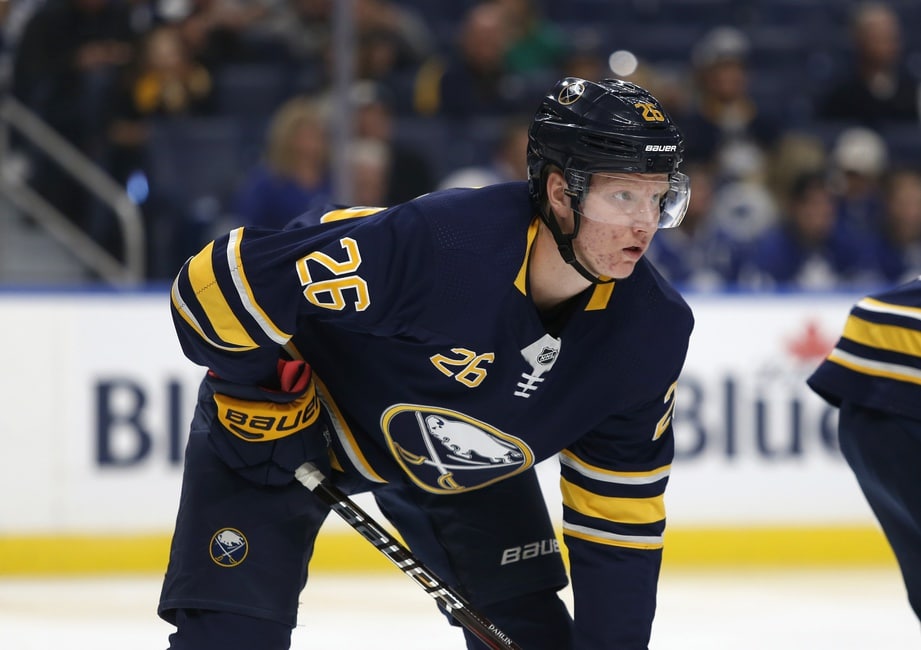
Just like everyone predicted, the Buffalo Sabres hold a 12-6-2 record through 20 games. Winners of five straight, Phil Housley has his group firing on all cylinders. As the team continues to improve, several players have found their offensive groove, including rookie defenseman, Rasmus Dahlin.
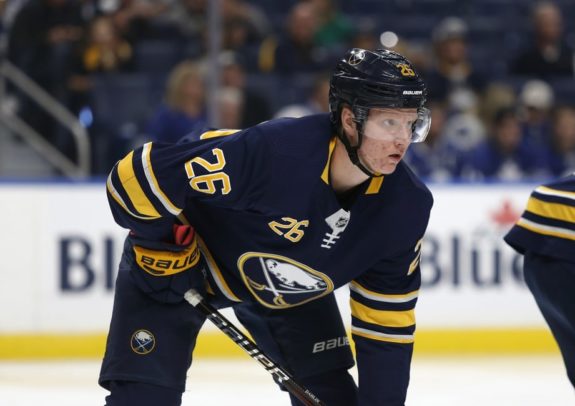
Sabres rookie defenseman Rasmus Dahlin has lived up to the hype as the first overall pick of the 2018 draft. (Timothy T. Ludwig-USA TODAY Sports)
As the first overall pick of the 2018 NHL Draft, expectations were set extremely high for the 18-year-old Swede, and he’s certainly lived up to his billing as a future franchise defenseman. With five points in his last four games, the offensive ability that fans observed on his highlight film from the SHL has transitioned nicely to the North American game.
Related: Upstart Sabres Silencing Doubters
An Immediate Upgrade
It’s no secret that the Sabres iced one of the worst defenses in the NHL last season. That being said, the 2018-19 defensive corps is made up of largely the same cast of characters, save for Dahlin and the effect he’s had is noticeable, to say the least.
With 10 points in 20 games to date, he leads all Sabres defensemen in that category, but his immediate veteran-like competence in the defensive zone is perhaps the most impressive aspect of his game. Not only has he played positionally sound hockey, but his ability to effectively execute outlet passes in transition has been a breath of fresh air for a Sabres team that had struggled in that regard prior to this season.
Rarely does one of Dahlin’s passes not land perfectly on the tape of his teammate’s stick. It wouldn’t even be too bold to say that he’s the best passer in the entire organization at this point. He’s that good. A lot of his steadiness as a pure defender got lost in the hype surrounding his awe-inspiring offensive ability when joining the rush, but fans in Buffalo are quickly becoming aware of just how complete his game truly is.
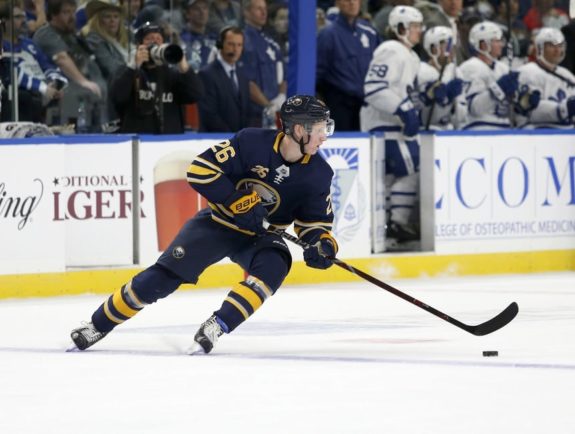
Dahlin’s ability in transition has been a breath of fresh air for Sabres fans. (Timothy T. Ludwig-USA TODAY Sports)
His demeanor on the ice is that of a much older player and after the Sabres orchestrated yet another comeback victory on Saturday night against the Minnesota Wild, his positivity and maturity behind the scenes became evident as well. The Twitterverse was buzzing following his postgame interview with the local media where he noted how satisfied with his team’s in-game mentality.
“It’s so easy to play on this team because we always know, even if we’re down two goals, we’re going to get back,” he said. “I love to have that feeling. I love to play on this team.”
After a 2017-18 campaign that left fans wondering just how much the situation had deteriorated within the Sabres’ locker room, hearing that sentiment from a young player is certainly a relief. As the team continues to experience success, team morale and solidarity will continue to grow as well. As a player who the team has invested in (both tactically and emotionally) as their franchise cornerstone on the blue line, Dahlin will play an important role in that process moving forward.
Managing Expectations
Prior to his recent offensive outburst, segments of the fanbase expressed concern over Dahlin’s frequent absence on the stat sheet, but it’s important to put things into context. Historically, defensemen don’t typically put up gaudy numbers in their rookie seasons, especially at 18 years of age.
Let’s take a look back at the rookie campaigns of three players who are widely considered as some of the top blueliners in the NHL today. We’ll start with Tampa Bay Lightning defenseman, Victor Hedman. In his first full season in the league, he too was 18 years old, and he didn’t exactly set the world ablaze in terms of offensive production. In fact, it took him three full years before he even cracked 30 points in a season.
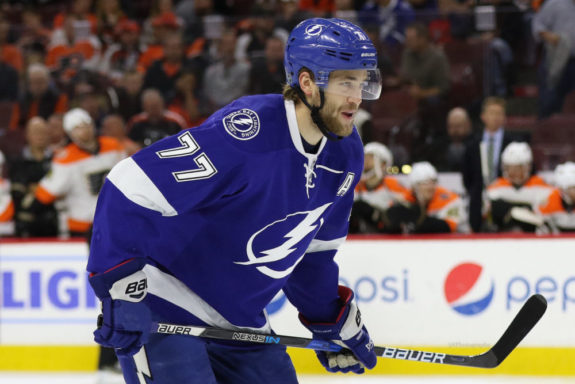
Lightning defenseman, Victor Hedman didn’t crack 30 points in a season until his fourth year in the league. (Amy Irvin / The Hockey Writers)
He isn’t alone in this category. As perhaps the most effective offensive defenseman in the league, Erik Karlsson took a considerable amount of time before developing into the statistical powerhouse he is today. While it didn’t take him nearly as long as it took Hedman, as a 19-year-old rookie, Karlsson only produced 26 points in 60 games. His production catapulted in the seasons to follow, but still, he did not have an immediate effect on offense in his inaugural campaign.
Rounding out the list is Nashville Predators’ cornerstone and perennial NHL All-Star, P.K. Subban. His situation is a little different since he was 21 years old before he played a full season, but the sentiment remains the same. In fact, from year one to year two, he actually regressed statistically (38 points in his rookie season and 36 points the following year) before absolutely exploding in his third season where he averaged nearly a point-per-game.
It’s still very early and a lot can change, but Dahlin’s current 41-point pace would best all three of the aforementioned veterans in their rookie seasons. Overall, it’s very important to keep things in perspective and be patient. Dahlin is well ahead of the curve already and he’s only going to get better from here. It may take some time for him to put up gaudy offensive numbers, but he’s on the right track.
Related: What to Expect From Sabres Young Core
Dahlin’s Ice Time
Another topic that has been debated amongst fans pertains to Dahlin’s ice time and deployment. Averaging 18:52 per game, he currently ranks fifth among Sabres defensemen. At this point, an argument can be made that he’s the team’s best defender. At the very least he’s in the top three. So why isn’t he seeing more action?
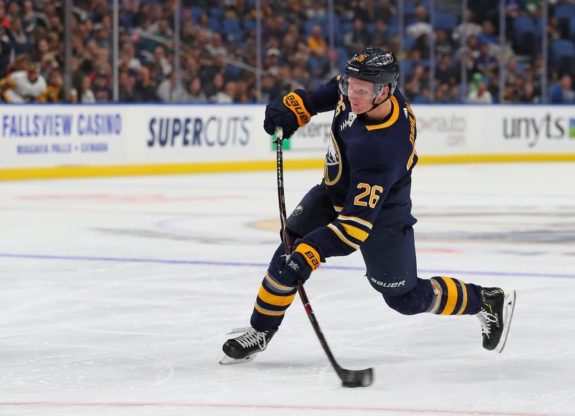
Dahlin is currently fifth among Sabres defensemen in average TOI. (Kevin Hoffman-USA TODAY Sports)
It’s has been speculated that Housley has been carefully easing Dahlin into an expanded role, allowing him to adjust to the NHL before tossing him out there against the league’s top offenses. There is definitely merit to that strategy as we’ve seen the Sabres hamper rookie development before by throwing players to the wolves before they were truly ready.
Another reason for his lack of minutes has to do with his situational deployment. While he has contributed on both the first and second power-play units, he hasn’t really been asked to participate on the penalty-kill in any meaningful capacity. Regardless, it already seems as though Housley is preparing to give him more responsibility. On Thursday night against the Winnipeg Jets, Dahlin skated for 22:57, his highest total of the year.
It will be interesting to monitor his utilization moving forward and truly get a feel for just how slowly (or quickly) Housley intends to bring him along. If he continues to prove himself as one of, if not the best defender on the roster, the second-year head coach may be more inclined to play him in more situations.
With a relative Corsi of 3.56-percent, Dahlin ranks second in that category among Buffalo defensemen. Contextually, that number is pretty impressive considering his offensive zone-start ratio of just over 50-percent, proving that he’s spending time in a multitude of different situations. Everything from the “eyeball test” to the advanced metric data suggests that he’s ready for more responsibility. Stay tuned.
Corsi Stats Courtesy of Corsica.Hockey
Be the first to comment